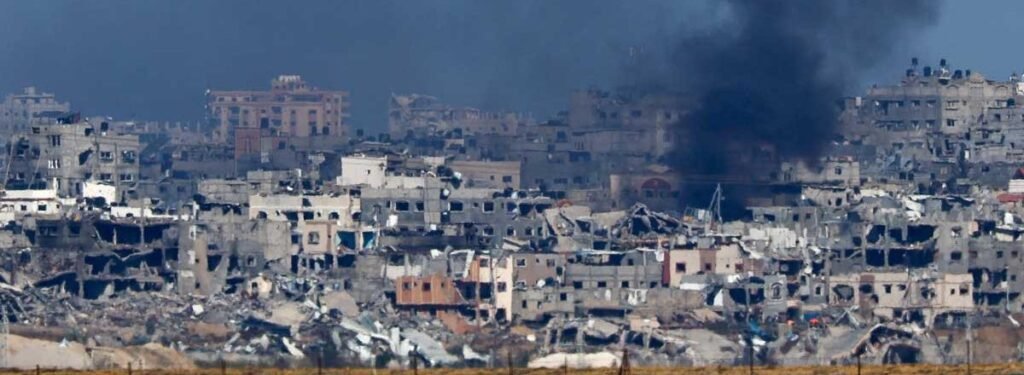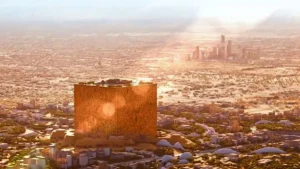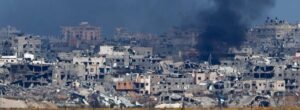
According to Palestinian sources and a hospital, an Israeli airstrike on a refugee camp in central Gaza killed at least 17 people, including seven children. Al Jazeera, however, has refuted Israeli allegations that six of its reporters are militants. Scroll and listen to The World.

Our live broadcast will resume tomorrow with additional analysis and updates.
Here are the main events that occurred during the day, in case you were just checking in.
In one of the most violent bombing nights the capital has seen in recent weeks, Lebanese media reported at least 17 Israeli airstrikes on the southern suburbs of Beirut.
According to organizers, an international meeting for Lebanon in Paris generated $1 billion in commitments for military and humanitarian support;
According to Palestinian authorities, an Israeli attack on a school-turned-shelter in central Gaza left 17 people dead and 43 injured.
According to the Israel Defense Forces, Hamas militants were preparing assaults on Israel and IDF personnel while working inside the school.
US-Israeli negotiators are scheduled to
Countries raise $1 billion for Lebanon’s army and relief.
According to organizers, an international meeting for Lebanon in Paris has garnered $1 billion in commitments for military and humanitarian support.
According to French Foreign Minister Jean-Noel Barro, the funds were divided 80-20 between the security forces and relief.
As was planned following the 2006 conflict, the latter aims to fortify Lebanon’s armed forces so they may be deployed in the south of the nation as part of any possible agreement to end the war.
Middle East specialist Rum Montez, editor-in-chief of Carnegie Europe’s blog Strategic Europe, stated that “there can be no sustainable peace and stability at the border between Lebanon and Israel without a strengthened Lebanese armed forces and UNIFIL.”
“As such, the French efforts are important and crucial for the way forward.”
Paris has the impetus to organize “a proper response to the massive challenge that the war in Lebanon now poses” because of France’s longstanding ties to the former colony of Lebanon and its powerful diplomatic influence.
Over 70 countries and international organizations attended the summit, and the US contributed the largest portion—$300 million.
Germany promised to provide $104 million in humanitarian help to Syria, a neighboring country where displaced people have fled, and Lebanon.
Experts have cautioned that because of Lebanon’s increasing reliance on an unofficial and cash economy, which is susceptible to corruption, providing help may prove difficult.
As political factions cannot agree on a new president, the nation, where Hezbollah essentially functions as a state within a state, has been without a leader for two years.
In images: The situation in Gaza is worsened by rising food prices.
Food shortages and skyrocketing costs throughout the enclave are being caused by a lack of humanitarian help entering Gaza.
The cost of goods like cooking oil, oranges, and auberges has skyrocketed, and residents of the enclave explain how a kilogram of sugar, which used to cost $1, is now $40.
Following the start of the conflict between Israel and Hamas last year, the majority of Gaza’s people lost their sources of income.
According to the UN, one in five individuals in the enclave are at risk of starving because of the high probability of famine.
The US was at the top of the list of nations urging Israel to let more humanitarian aid to enter Gaza.
In the first 12 days of October, only 5,840 tons of food entered Gaza, compared to 75,898 tons in September, according to Cogat, the Israeli military organization in charge of overseeing crossings into Gaza.
Israel said Al Jazeera established a “secure telephone line” with Hamas.
According to the Israeli military, Al Jazeera set up a “secure line” with Hamas last year so that they could speak in a “classified manner.”
Additionally, it claims that Hamas instructed the Qatar-based TV network’s reporters on how to report on a failed 2022 Islamic Jihad rocket launch.
It further stated that the guidelines included refraining from using the phrase “massacre,” minimizing the number of photos from the tragedy that were shown, and making sure that panelists did not disparage Hamas.
“How Hamas directs Al Jazeera’s media coverage to serve its own interests” is revealed in a number of papers that the Israel Defense Forces included with its assessment.
Al Jazeera has not yet addressed the most recent accusations.
Six Palestinian Al Jazeera correspondents in Gaza were named by the IDF earlier today for allegedly being affiliated with Hamas or violent Islamic Jihad groups (see post 07.15).
Al Jazeera dismissed the allegations as an effort to keep its reporters quiet.
For background, Israel has long accused Al Jazeera of being a mouthpiece for Hamas, and in the last year, its police have raided its offices, seized equipment, and ordered the network to cease operations for security reasons.
The network has accused Israeli forces of intentionally killing a number of its journalists during the war in Gaza and claims it has no affiliation with militant organizations.
“It is incomprehensible to witness the lack of humanity in northern Gaza.”
“Incomprehensible” is how one UN agency for Palestinian refugees employee describes the lack of humanity he has seen in northern Gaza.
In the face of ongoing Israeli military activity, Sam Rose claims it is “essentially impossible” for UNRWA to offer any type of aid to residents stranded in the enclave’s northern region.
Mr. Rose recounts the events in Jubail, where all eight of the local water wells have dried up and bakeries have run out of flour, the only food remaining in the area.
“When we think that this conflict can’t get any worse, sadly, it has the ability to plummet further,” he told Sky News.
“The lack of humanity in northern Gaza that we observe
According to Mr. Rose, if no one in the northern part of Gaza has access to a polio vaccine, the situation might get worse.
Due to the increasing hostilities in northern Gaza, the World Health Organization had to postpone the last phase of its polio vaccine program, despite having vaccinated over half a million Palestinian children.
In order to reach its goal of immunizing 119,279 youngsters in northern Gaza, this last round of vaccinations depended on humanitarian breaks in hostilities.
Now, if the last stage cannot be finished, the entire campaign may be in jeopardy.
If a portion of the population has received live polio vaccinations, the vaccine can be ingested when it is released into the water supply.


